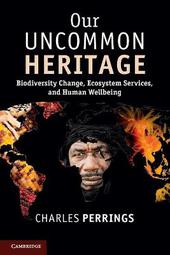
|
Our Uncommon Heritage: Biodiversity Change, Ecosystem Services, and Human Wellbeing
Paperback / softback
Main Details
| Title |
Our Uncommon Heritage: Biodiversity Change, Ecosystem Services, and Human Wellbeing
|
| Authors and Contributors |
By (author) Charles Perrings
|
| Physical Properties |
| Format:Paperback / softback | | Pages:557 | | Dimensions(mm): Height 229,Width 150 |
|
| Category/Genre | Environmental economics |
|---|
| ISBN/Barcode |
9781107618985
|
| Classifications | Dewey:577 |
|---|
| Audience | | Professional & Vocational | |
|---|
| Illustrations |
35 Tables, black and white; 41 Line drawings, unspecified
|
|
Publishing Details |
| Publisher |
Cambridge University Press
|
| Imprint |
Cambridge University Press
|
| Publication Date |
17 April 2014 |
| Publication Country |
United Kingdom
|
Description
Biodiversity change is the biggest environmental problem of our time. It leads to much more than species extinctions, affecting the food we eat, the diseases we face, our vulnerability to fire and flood, and our ability to adapt to climate change. Our Uncommon Heritage explores the many dimensions of human-driven biodiversity change. It integrates ecology, economics and policy to examine the causes and consequences of changes in ecosystems, species and genes, and to identify better ways to manage those changes. It explores the place of biodiversity in the wealth of nations, the rights and responsibilities people have for natural resources at local, regional, national and international levels, and the challenges faced in protecting the common good at the global level. This is an important book for students and researchers in the fields of conservation and sustainability science, ecology, natural resource economics and management. It also has much to say to those engaged in international conservation, health, agriculture, forestry and fisheries policy.
Author Biography
Charles Perrings is Professor of Environmental Economics at Arizona State University, where he directs the Ecoservices Group. He was for several years vice-chair of the international biodiversity science research program, DIVERSITAS, and more recently represented the International Council of Science in negotiations with national governments to establish the Intergovernmental Science-Policy Platform on Biodiversity and Ecosystem Services (IPBES).
Reviews'Our Uncommon Heritage is comprehensive in its range and incisive in its treatment. In his analysis of changes in biodiversity, the author straddles, with expert understanding, different sciences. He then excels in employing and extending the metaphors of economics to capture the concerns of natural scientists. Arguing for integrated models and analysis that can enable realistic social policy experiments, the volume drives home the compelling need for forward looking decision making in the interest of conservation of humanity's 'uncommon heritage' for future generations.' Kanchan Chopra, former Director and Professor, Institute of Economic Growth, University of Delhi 'Charles Perrings has been deeply involved for decades in the complex issues of international biological diversity science, assessments and policy. He draws upon this experience to craft a thoughtful and wise roadmap for a more positive future for the natural resources that underpin human well-being.' Harold Mooney, Stanford University 'This book does a great service to the effort to stop Biodiversity being seen only as an assemblage of useful or charismatic species, but instead as ecosystems that house the planet's biological wealth and provide us with a score of indispensable environmental services. It also supports the idea that private benefits cannot have precedence over social well-being in the use of our Natural Capital. This is essential reading for anyone seriously interested in entering or exploring in more detail the field of sustainability in the broader sense.' Jose Sarukhan, Emeritus Professor, Instituto de Ecologia, UNAM and National Coordinator, CONABIO '... a comprehensive examination of the ecology, economics, and policy of human-driven biodiversity change.' M. Morgan-Davie, Choice
|